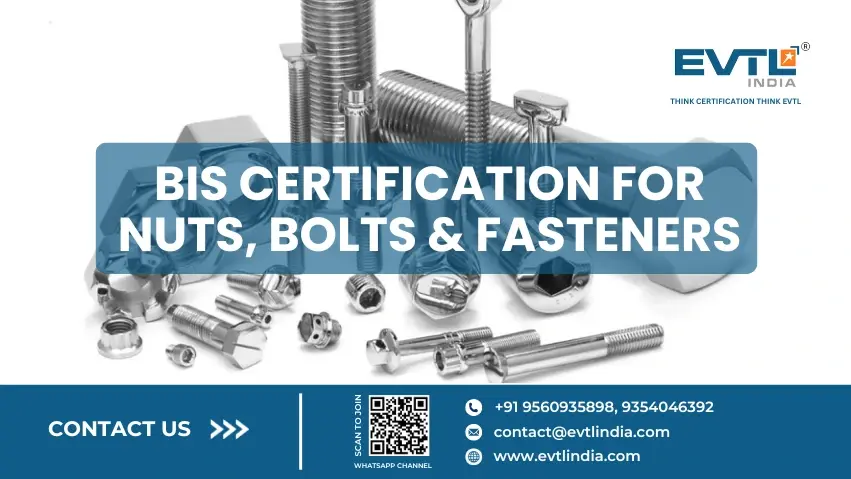Bolts, nuts, and fasteners are essential mechanical components widely used in manufacturing, construction, automotive, aerospace, railways, and infrastructure projects. These products play a vital role in ensuring structural strength, durability, and operational safety. Due to their critical applications, the Government of India has made BIS Certification for Nuts, Bolts, and Fasteners mandatory under the regulations of the Bureau of Indian Standards (BIS). This certification ensures compliance with Indian Standards through strict quality control, product testing, and inspection processes, helping manufacturers improve product reliability, meet regulatory requirements, and build customer confidence in the Indian market.
What is BIS Registration for Nuts, Bolts, and Fasteners?
BIS Registration for Nuts, Bolts, and Fasteners is a conformity assessment process that ensures the products meet the applicable Indian Standards (IS). Once certified, manufacturers are authorized to use the ISI Mark, which signifies that the fasteners comply with prescribed quality, safety, and performance standards.
The BIS certification framework aims to eliminate substandard products from the market and protect public safety, especially in high-risk industrial applications.
Legal Importance of BIS Certification for Nuts, Bolts, and Fasteners
Although small in size, fasteners carry heavy loads and stresses. Failure of a nut or bolt can result in serious structural damage, financial loss, or even fatalities. ISI Certification for Nuts, Bolts, and Fasteners helps ensure:
- High mechanical strength and durability
- Consistent dimensional accuracy
- Proper chemical composition of raw materials
- Resistance to wear, corrosion, and fatigue
- Compliance with government regulations
Additionally, BIS-certified products are mandatory for government tenders, PSU projects, and large infrastructure developments
Applicable Indian Standards (IS)
BIS has notified multiple Indian Standards for different categories of fasteners, including:
Each product must strictly conform to the specific IS standard applicable to its design, size, and application to obtain a BIS License for Nuts, Bolts, and Fasteners.
BIS Certification Process for Fasteners
The BIS certification process involves the following steps:
1. Application Filling: Submission of an online application with product details, factory information, and relevant Indian Standards.
2. Product Testing: Samples are tested at a BIS-recognized laboratory for mechanical strength, hardness, chemical composition, and dimensional accuracy.
3. Factory Inspection: BIS officials inspect the manufacturing unit to verify production processes, quality control systems, and in-house testing facilities.
4. Grant of BIS License : Upon successful compliance, BIS grants the ISI Certification for Nuts, Bolts, and Fasteners, allowing the use of the ISI mark.
5. Surveillance and Renewal: Periodic audits and testing are conducted to ensure ongoing compliance.
Documents
Required for BIS Certification :
To obtain BIS approval, manufacturers must submit documents proving product compliance and manufacturing capability. The key documents include:
- Manufacturing unit registration and legal documents
- Factory layout plan and machinery details
- Quality control procedures and in-house testing information
- Raw material specifications and material grades
- Product test reports from BIS-recognized laboratories
- Authorization letters and required undertakings
Foreign manufacturers must additionally appoint an Authorized Indian Representative (AIR) to coordinate with BIS for documentation, testing, inspections, and ongoing compliance.
Support services offered by BIS Consultants and agents
Due to technical requirements and regulatory procedures, many businesses rely on professional support to streamline the process:
● Initial BIS Consultants for Nuts, Bolts & Fasteners : Provides documentation, testing coordination, and compliance guidance.
● ISI Consultants for Nuts, Bolts & Fasteners : Helps obtain and maintain the ISI
mark.
● Modifications BIS Agents for Nuts, Bolts & Fasteners: Manages application filing, communication with BIS, and renewals.
● BIS QCO Compliance Support: Ensures adherence to Quality Control Order requirements.
These services help businesses avoid delays, minimize errors, and achieve faster approvals.
Conclusion
BIS Certification for Nuts, Bolts, and Fasteners in India is a crucial regulatory requirement that ensures product quality, safety, and reliability in critical industrial applications. By complying with applicable Indian Standards and Quality Control Orders, manufacturers and importers can legally manufacture, sell, and distribute fasteners in the Indian market. BIS and ISI certification helps prevent substandard products, enhances customer confidence, and enables participation in government and large infrastructure projects. With proper testing, inspection, and surveillance, BIS certification supports long-term business growth, regulatory compliance, and sustained trust across manufacturing and infrastructure sectors.
FAQs
1. What is the significance of ISI mark?
The Indian Standard Conformity Mark single-use product is certified by the BIS mark. When it comes to bolts, nuts, and fasteners, it provides customers with a quality and safety guarantee.
2. What happens if a manufacturer offers fasteners that are not certified?
The Bureau of Indian Standards Act, 2016 should penalise the sale of non-certified goods since it is an act of order violation.
3. Can foreign manufacturers obtain BIS
certification?
Yes, foreign manufacturers can apply
for BIS certification to sell their products in India.
4. What are the penalties for selling
non-certified fasteners?
Selling non-certified products is
punishable under the Bureau of Indian
Standards Act, 2016, with fines and potential bans.
5. How long does the certification process take?
The process typically takes 4–6
months, depending on testing and inspection timelines.
6. Are all bolts, nuts, and fasteners covered
under the QCOs?
Only specified categories are covered.
Manufacturers should consult the QCOs to determine if their products fall
within the scope.
7. What are the costs associated with BIS certification?
Costs include application fees, product testing charges, factory inspection costs, and annual license fees.
8. What does bolt, nut and fasteners BIS Certification mean?
Bolts, nuts, and other fasteners that meet the necessary Indian Standards (IS) for performance, quality, and safety are guaranteed by BIS Certification. After the QCOs, only goods bearing the ISI mark are permitted for sale in India.
9. Is BIS Certification required for all kinds of fasteners?
BIS certification is required for certain bolts, nuts, and fasteners specified in the Quality Control Orders (QCOs) of 2023 and 2024.





















